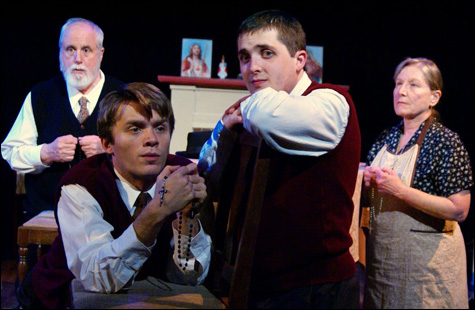
WHERE TO GO FROM HERE? Philadelphia?
|
|
Philadelphia, Here I Come!
by Brian Friel | Directed by Tony Reilly | Produced by the American Irish Repertory Ensemble, at the Portland Stage Company’s Studio Theater | through May 11 | 207.799.5327
|
Compared to the staid, changeless Irish village of Balleybeg, America seems like a “vast restless place,” a land of “impermanence and anonymity,” and a country where “nobody gives a damn about the past.” It's pure manna to 25-year-old Gar O’Donnell (Ian Carlsen). For years, he’s been working a dead-end job for his taciturn widower father, and now he has the itch to get out and go bigger. He’s laid his plans: he’ll land in Philly, room with his aunt and uncle, and work greeting guests in the hotel up the street. All that remains is to make his goodbyes to Balleybeg — and to take a good gander at his real reasons for leaving. Naturally, it’s all a lot harder than he was figuring on, in Brian Friel’s sentimental 1964 tragic comedy, Philadelphia, Here I Come!, directed by Tony Reilly for the American Irish Repertory Ensemble.
Luckily — and sometimes unluckily — for Gar, he has help: His inner consciousness, the “Private” Gar (the energetic Nathan Amadon), hovers constantly about him, counseling and goading him through his encounters and reckoning. The Private Gar talks up the Public Gar as he primps in the mirror, helps him play out fantasies (encounters with great capitalists and buxom American blondes), and cruelly reminds him of his pangs for old flame Kate (Stacy Ann Strang). He tries to staunch Gar’s emotions as he talks with longtime housekeeper Madge (Susan Reilly) or his wrecked old schoolmaster Boyle (Tony Reilly). The Private Gar also provides non-stop commentary during otherwise silent meals with his uncommunicative father/boss S.B. O’Donnell (David Butler, who does a subtle job of making the tired old man both ridiculous and tragic). In a sense, Philadelphia is a buddy play, albeit a rather lonely one.
The Public Gar is a very physical character, strutting and posturing his way through insecurities, and especially as he walks through his Private fantasies — our first look at him has him acting out the piloting of a plane over America and the kicking of a crucial soccer goal. I can’t think of a better young actor to pull off these corporeal rigors. Carlsen has an exceptionally engaging physical presence; not just Gar’s rowdy playacting but also his quieter, less intentional gestures — a sudden slope of his shoulders, the set or sag of his jaw — are a pleasure to watch.
In fact, AIRE’s production could highlight his subtler physical work a bit more. Because Gar, like most of us, thinks a lot more than he says, the Private Gar often dominates a series of one-sided conversations with unsuspecting others — particularly during a visit between S.B. and the Canon (a poignant turn by Jeffrey Roberts). As Private Gar listens through the wall, Public Gar hangs out with the older men, passing a stream of commentary. Amadon delivers all this with irrepressible timing and tone, but over in the other room, Carlsen’s facial responses to everything go under-lit. His work during scenes like this would stand up to a stronger spot, particularly since it’s so important for us to associate the Private Gar with the unspoken but strongly felt emotions of the Public one.
As both Public and Private Gars recall the past and negotiate his fraught leave-taking, they encounter several characters given crack portrayals by AIRE regulars. Maureen Butler is a bright, drunken delight as Gar’s alternately tough and teary Aunt Lizzy, who put the America seed in his head in the first place. Susan Reilly’s no-nonsense Madge, in great contrast to Lizzy, is wry and understated. And director Reilly is engaging in three small roles, particularly as the schoolmaster-poet, with his pronounced sense of the tragic. As for the Gars, Carlsen and Amadon have a wonderful rapport and lively, kinetic timing. Amadon keeps tension and dynamics moving in a role that the script tends to drag on in the second act, and Carlsen’s physicality and feeling convey the conflicts and tragedies of Gar’s departure.
For Gar, America might come to be either “God’s own country” or “just another place to live.” But as the Canon says, “That’s not this day nor yesterday.” For now, negotiating his own hometown is frontier enough.
Megan Grumbling can be reached at
mgrumbling@hotmail.com
.